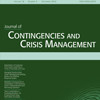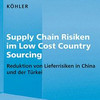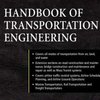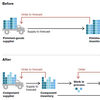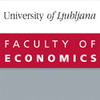 Normally, when finding topics for this blog, it is I who have to seek out and find the established or ongoing research that I want to promote. Occasionally, ongoing research finds me and asks for help in spreading the word, and most of the time I am more than happy to oblige. This time it is Peter Trkman and Kevin McCormack, whose research on supply chain turbulence was featured on this blog some 6 months ago. Together with Marcos Paulo Valadares de Oliveira they are currently researching how risk management practices can add value to the organization, what the modifying effects of turbulence are, and what risk management orientation companies subscribe to. For this they are conducting a survey, and asked for my help in increasing the number of respondents by advertising their survey on my blog.
Normally, when finding topics for this blog, it is I who have to seek out and find the established or ongoing research that I want to promote. Occasionally, ongoing research finds me and asks for help in spreading the word, and most of the time I am more than happy to oblige. This time it is Peter Trkman and Kevin McCormack, whose research on supply chain turbulence was featured on this blog some 6 months ago. Together with Marcos Paulo Valadares de Oliveira they are currently researching how risk management practices can add value to the organization, what the modifying effects of turbulence are, and what risk management orientation companies subscribe to. For this they are conducting a survey, and asked for my help in increasing the number of respondents by advertising their survey on my blog.
The survey
The survey is titled Value Generation through Supplier Risk Management and has been prepared as part of a research project to explore the potential value associated with effective risk management in supplier relationships. With Hiperos as their lead sponsor, the aim of the survey is to provide insight into the supplier risk management practices and attitudes of organizations across multiple industry segments.Interestingly, that they are not addressing traditional supply chain risk (e.g.. forecasts, availability, price volatility), but supply base risk (e.g. risk associated with quality, performance, regulatory compliance, and corporate responsibility). The survey takes about 15 minutes to complete and is aimed at C-level executives, e.g. purchasing directors, board members and alike.
The survey starts off with a couple of open-ended questions:
- How would you describe supplier risk management?
- How would you describe a risk event?
- What types of risk events have you experienced recently?
As to risk management orientation, some of the statements to be considered are
- Top Management’s involvement with risk management is strong.
- Risk management is a part of the culture of our organization.
- Risk management is considered an investment not a cost.
When answering risk management practices, the respondents must answer, among other, whether
- Our risk management function is very well established.
- We perform a very detailed assessment when assessing external risk.
- We effectively measure and monitor risk indicators to predict events.
How companies are protecting intellectual property is also an issue in supplier risk, e.g.
- We often deem the risks too high for sharing knowledge with a supplier.
- We strongly respond after a “knowledge leak” has occurred.
- We monitor/estimate the costs of knowledge sharing.
These are just some of the questions asked. If you would like to take the full survey, including answering statements concerning supply chain turbulence and supply chain performance, please follow the link below.
Link: Take the survey
Author links
- linkedin.com: Peter Trkman
- linkedin.com: Kevin Mc Cormack
- ufmg.br: Marcos Paulo Valadares de Oliveira
Related posts
- husdal.com: Supply chain risk in turbulent environments
- husdal.com: Hiperos and supplier risk
- husdal.com: Zycus and the Supply Risk Explosion

